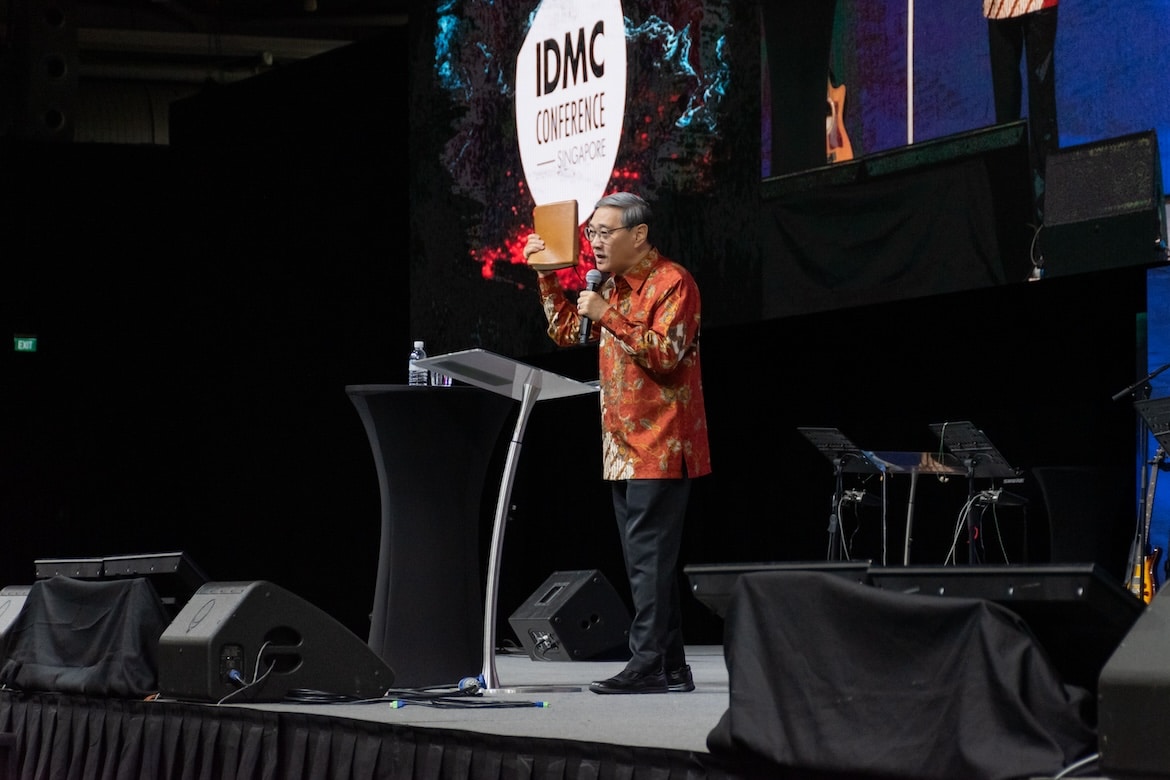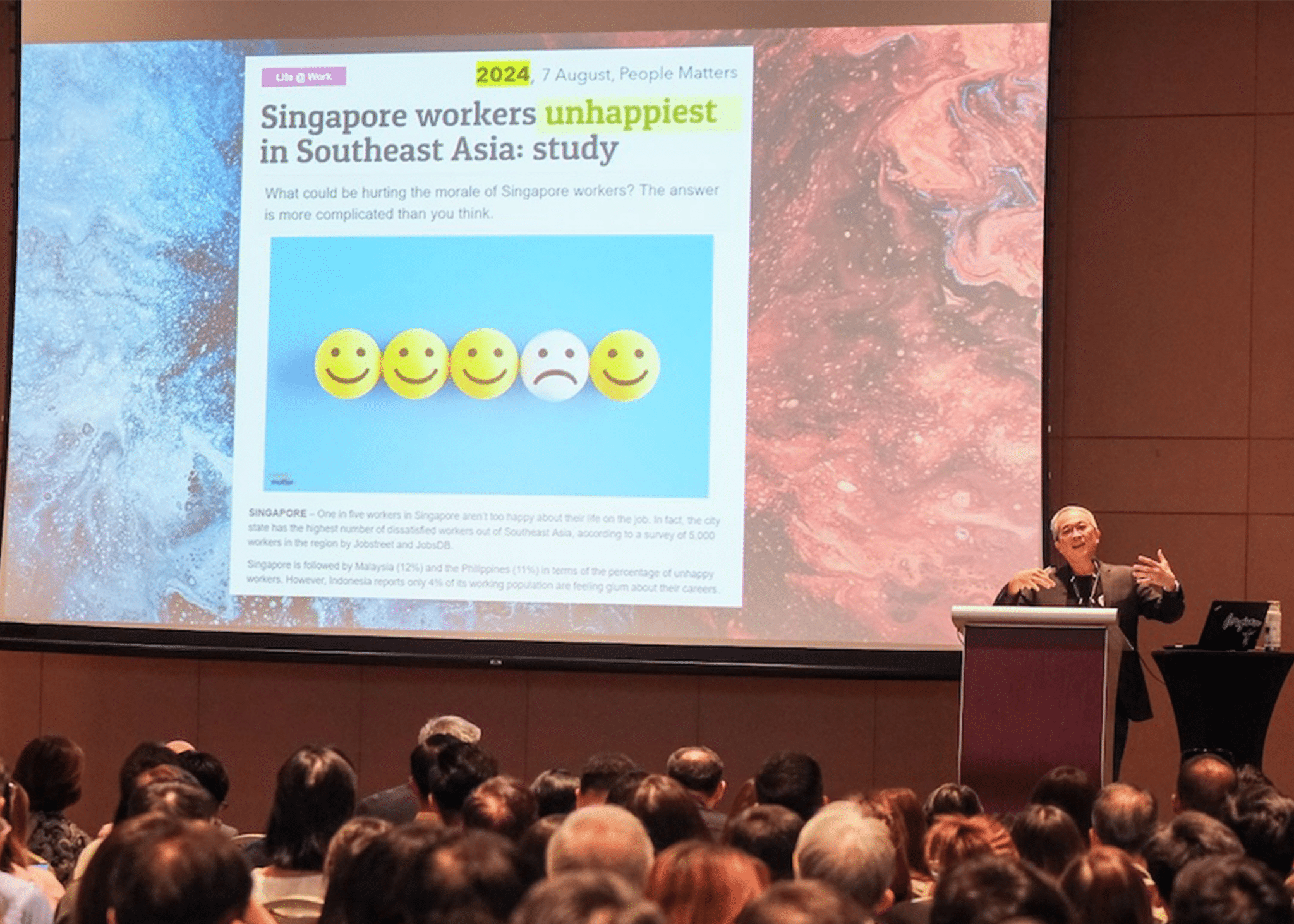Is there a double love in your life?: Rev Edmund Chan on the destructiveness of a divided heart
by Gracia Lee // September 11, 2020, 10:26 pm

Rev Edmund Chan, Day 2, IDMC 2020
A heart that is divided in its loyalties is subtle and difficult to detect, yet extremely destructive to true discipleship, warned Reverend Edmund Chan in a plenary session at the Intentional Disciple-Making Churches (IDMC) 2020 conference on September 4.
“This spiritual syncretism of serving the Lord, fearing the Lord, and yet serving our own gods … is subtle and dangerous, and it’s in the Church of Jesus Christ today,” he said to an online audience of 5,000 on livestream.
Urging listeners to repent from this “double-mindedness”, he added: “We must turn from that which displeases God, to follow hard after Him … There should not be a double love in our lives, a double loyalty in our lives.”
Compromises of a divided heart
Rev Chan, who is the leadership mentor at Covenant Evangelical Free Church and founder of the Global Alliance of IDMC, said it was at the beginning of the Covid-19 pandemic that the Lord revealed to him the need for the Church to turn from their divided loyalties.
“There should not be a double love in our lives, a double loyalty in our lives.”
“In this pandemic, Christian leaders everywhere have issued a concerted call for repentance. That’s the right thing to do (2 Chronicles 7:14). But here’s the question: What exactly are we to repent of?”
As he prayed about this, the Lord brought his attention to 2 Kings 17, where he received a “prophetic burden” as he meditated on Israel’s spiritual decline.
“2 Kings 17:15 says that they went after false idols and became false … So, I said, Lord, this is an open Bible. Here is an open heart. Speak to me. How did they come to this state?”
Digging deeper into the chapter, he found eight compromises that Israel had made, which eventually led to their spiritual decline:
- A lack of gratitude. Even though God had delivered Israel out of their bondage in Egypt, they did not fear Him. Rather, they feared other gods (2 Kings 17:7).
- Idolatry in their lives. Israel did not just fear other gods, they also served them (2 Kings 17:12).
- Conformity to the pagan culture. They walked in the customs of the nations whom the Lord had driven out (2 Kings 17:8). Compromise leads to conformity.
- The culture without became their culture within. As they conformed to the pagan culture, their own culture was changed.
- They did things in secret. What we do in secret, where nobody sees, nobody knows, will determine the foundation of our lives. It is in the secret places where our lives are built or compromised.
- They failed to heed God’s warnings. God, out of His grace and loving kindness, warned them by every prophet and every seer (2 Kings 17:13), but Israel would not listen (2 Kings 17:14).
- Their hearts became stubborn. Watch out for these inner realities, these fault lines within our souls that stop us from turning from our sin when God warns us.
- They walked in unbelief. Like their fathers, they did not believe in the Lord their God (2 Kings 17:14).
A dark root
As Rev Chan continued reading the chapter, he came to 2 Kings 17:33 – “one verse, one dark root, that broke me”, he shared.
“So they feared the Lord but also served their own gods, after the manner of the nations from among whom they had been carried away.” (2 Kings 17:33)
It was the answer to the question he had been asking the Lord. “This is exactly what we need to repent of – worshipping God while holding fast to our own idols,” he said.
What we do in secret, where nobody sees, nobody knows, will determine the foundation of our lives.
Rev Chan noted that many think there are only two categories of Christians in the Church today – those who are worldly-minded and those who are on fire for God.
But the reality is that there is a third category: Those who are double-minded, he said.
“The double-minded Christian is very hard to spot. Why? It’s very subtle. From the ground level up, there is no difference (between them and) the godly Christian who is on fire for God.
“The difference is what is within. They are worshipping God while holding fast to their own idols.”
“This is exactly what we need to repent of – worshipping God while holding fast to our own idols.”
The right response to this realisation is repentance, where God’s grace awaits, added Rev Chan.
“Whatever is an idolatry in my life, I want to deal with it because I don’t want to live a double life, living with double loyalties, leading to a double love.
“Not because I have to speak to you about whole-life discipleship … but because I know that the deepest joy is the joy of following Jesus wholeheartedly.”
Beware of the joy robber
However, Rev Chan acknowledged that being a wholehearted disciple of Christ is easier said than done.
“Many aspire, few attain. And those who attain know it is not by their own strength.”
“Many aspire, few attain. And those who attain know it is not by their own strength. It’s out of a spirit of contriteness and brokenness, out of that understanding and that conviction of the duplicity of their lives, out of the understanding that double-mindedness destroys discipleship,” he said.
Shifting his focus to Numbers 11:1-9, which he described as “one of the saddest commentaries of the children of Israel in their wandering years”, he noted two besetting sins that had hindered them from attaining true discipleship.
The first was a lingering longing for the past (Numbers 11:4-5).
“Longing for the past can be a joy robber, especially when we ignore present opportunities and future redemptions.”
“They were longing but never having, craving but never fulfilling, wanting but never getting. And get this – they were upset with God,” said Rev Chan.
In their “intoxicating” craving for more, the Israelites forgot their past bondage in Egypt and took for granted their past deliverance. They failed to see and appreciate God’s presence, glory, provision and grace in the present wilderness, he added.
“They were spoilt brats,” he said simply. But lest we are too judgmental or harsh, Rev Chan cautioned, we should also examine our own cravings and complaints.
“Longing for the past can be a joy robber, especially when we ignore present opportunities and future redemptions in the living for the glory of God.”
Watch out for discontentment
The Israelites’ second sin was harbouring a deep discontentment with God, said Rev Chan.
Even though God had miraculously provided manna to sustain them in the wilderness, they complained that it was not good enough.
“For even in the wilderness, God’s love never ceases, His faithfulness never comes to an end.”
The source of their discontentment was “a spirit of entitlement and a profound lack of gratitude”, said Rev Chan. “When their desires are misplaced, their devotion is mismatched.”
Would the Israelites have been satisfied if God had provided for their every wish, fancy or craving?
“No,” said Rev Chan. “Because the spirit of entitlement and the lack of gratitude would still cause them to despise the provision of God.
“Why? Because their delight was not in Him, because their craving would not be quenched. Rather, their appetites would merely be enlarged.
“It is time for Christians to drop their spirit of entitlement … to take a fresh delight in God even through the wilderness.”
“Listen – God would be a cosmic imbecile if he made our short-sighted desires and wills the cosmic reference point for his sovereign will.”
Cautioning against being “prisoners of our own passions”, he added: “It is time for Christians to drop their spirit of entitlement and that lack of gratitude, to take a fresh delight in God even through the wilderness.
“For even in the wilderness, God’s love never ceases, His faithfulness never comes to an end.
“What is needed in discipleship today is a whole-life discipleship that moves us from a double-mindedness to a single-hearted, single-minded devotion in every arena of our life.”
Discipling the remnant
Rev Chan added that in these troubling days, God is raising up a “mighty remnant” who will keep His commandments and follow in His way, just as King Hezekiah did in 2 Kings 18.
“By your grace, for your glory, change us, so that we can live as disciples of Jesus – the whole of life, or the whole of life.”
There are two aspects of this remnant, he noted.
The first is the Church of God, which is being sanctified by God to heed His warnings and hunger for his Word and ways.
The second is the “holy seed” within each of our hearts, a spiritual passion and spark that God has deposited in us, which we can ask Him to fan into flames.
Reading further to 2 Kings 19:30-31, we also find a promise for this remnant – that the Lord will establish it and make it bear fruit, said Rev Chan.
“And the surviving remnant of the house of Judah shall again take root downward and bear fruit upward. For out of Jerusalem shall go a remnant, and out of Mount Zion a band of survivors. The zeal of the Lord will do this.”
Wrapping up the session, he asked: “Would we turn from our own cravings, our own idols to serve the living God? Would we be free so we are not a prisoner of our own appetites? Because that’s what whole life discipleship is all about, the whole of life in every aspect of our lives.
“When we say Lord you are sovereign, we turn from our ways, we heed God’s warnings and we come to say: By your grace, for your glory, change us, so that we can live as disciples of Jesus – the whole of life, for the whole of life.”
It takes work to rest: Reverend Edmund Chan on the “strange principle” of rest during Covid-19
We are an independent, non-profit organisation that relies on the generosity of our readers, such as yourself, to continue serving the kingdom. Every dollar donated goes directly back into our editorial coverage.
Would you consider partnering with us in our kingdom work by supporting us financially, either as a one-off donation, or a recurring pledge?
Support Salt&Light



